| Reviews & Columns |
|
Reviews DVD TV on DVD Blu-ray 4K UHD International DVDs In Theaters Reviews by Studio Video Games Features Collector Series DVDs Easter Egg Database Interviews DVD Talk Radio Feature Articles Columns Anime Talk DVD Savant Horror DVDs The M.O.D. Squad Art House HD Talk Silent DVD
|
DVD Talk Forum |
|
|
| Resources |
|
DVD Price Search Customer Service #'s RCE Info Links |
|
Columns
|
|
|
Unforgivable
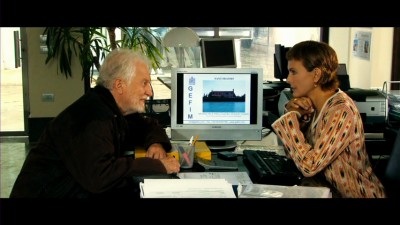
Watching Unforgivable, the latest from reliably modest director André Téchiné (who once upon a time, in 1994, surprised everyone by breaking his mold to make the more interesting Wild Reeds), makes one miss Claude Chabrol, his late colleague. Both of these long-running French filmmakers have a tendency to explore the convoluted clockwork ticking away inside the cultivated, living-well, but stifled French bourgeois family. But as Unforgivable (like Téchiné's Changing Times before it) ultimately demonstrates, whereas Chabrol, with his Hitchcockian subversiveness, could wring everything from sinister devastation (La Cérémonie) to strange magic (The Girl Cut in Two) from the rarefied, sealed-off milieu of haute-bourgeois families with businesses and/or money, Téchiné contents himself with trying to position the familiar commonplaces of such characters -- their half-desultory romances, infidelities, careerism, family dramas and little scandals, and overall comfortable world-weariness -- as suitable, endlessly recyclable raw material for his assured, elegant brand of cinematic storytelling. That's not to say, however, that something like Unforgivable doesn't have its own sort of worthwhile, if moderate, charm; if Téchiné seems almost to have chosen his story at random (so long as it had some sexual intrigue and a hint of mystery or treachery to it, it could've been almost anything), the film's unremarkable edifice of story and plot is interesting not for itself, but for what he is able to build upon it -- the manner in which he tells the story much more so than what has to be characterized, in the case of Unforgivable as much as in many other typical Téchiné films, as the convoluted, soap-operatic story itself.
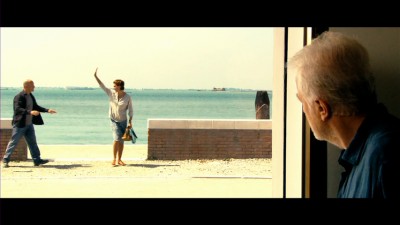
Téchiné's construction of Unforgivable's alluring aura is given a boost by his having provided himself a great many fascinating things to put up on the screen for us to look at, starting with the eye-catching milieux of Venice and its nearby Italian island and moving on to a cast that includes distinguished silver-haired actor André Dussollier (Tell No One, Wild Grass) as high-selling French crime novelist Francis, who's running out of money and inspiration and thus looking to move to some remote, luxe Italian location to overcome his writer's block, and onetime Bond and Bunuel girl Carole Bouquet as his much younger Italian object of affection (and, eventually, wife), Judith, the cultivated, accomplished, and sexy middle-aged travel/home-rental agent who helps him out and catches his eye. The mysterious Judith has an illustrious Euro-trash past for Francis to unveil, including adventures as an international art dealer, being a druggy hanger-on to the a penniless aristocratic Italian family, and an affair with an alcoholic private detective twice her age, Anna Maria (Italian screen legend Adriana Asti, The Phantom of Liberty, The Best of Youth), who now, years later, is still her good friend despite her continuing, painfully unrequited feelings for the now-married (to a man!) Judith.
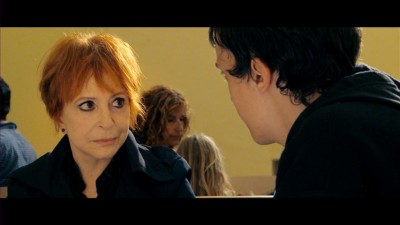
Téchiné disarms us by offering up intimate (and often very nicely composed/shot) sequences created with panache, hitting the ground running with the film's initial unfolding of plot, wherein Francis and Judith's relationship segues from business to marriage with such nicely played and filmed, well-tailored, relaxed dramatization that we barely notice its suddenness or unlikeliness. But Téchiné has a cascading ton of story to tell, and he does so by frequently bridging these intuitively well-made chunks of film with titles that come up unexpectedly ("Summer, four months later," etc.), skipping us ahead at odd moments and eliding any slack between the frequent, juicy high points in the unbelievably extensive drama to which Francis and Judith's marriage and isolation on an island off the coast of Italy will subject them. The plot's first thickening is the visit to their pretty little island home of Francis's grown daughter, Alice (Mélanie Thierry, Babylon A.D.) and his granddaughter, Vicky (Zoé Duthion); Alice is a recovering addict, stuck in a marriage that's run its course, with whose dealer/lover, a broke Italian aristo called Alvise (Andrea Pergolesi), Judith herself has had a previous fling, Alvise being the son of her Venetian countess friend (Sandra Toffolatti). Alice "disappears," throwing Francis into a panic even though everyone knows she's run off with Alvise; Francis tempts the ailing, perpetually vodka-sloshed Anna Maria out of retirement to track down Alice, then does the same thing with Anna Maria's son Jérémie, a violence-prone sensitive soul just out of jail, paying him to follow Judith on frequent work trips to Venice that Francis suspects are a cover story for infidelity. And that's not even getting into Téchiné's catchy but empty moments of homage to the higher-browed, bona-fide European art cinema of the past (Look! That low-angle shot of a statue against the sky is straight out of Contempt! And there's some cleverly interpolated footage of Bertolucci's Before the Revolution, in which Asti starred, standing in for a flashback of Anna Maria in her youth!), or the somehow significant subplots of the dog Jérémie adopts and the torch he himself has long carried for Judith, his own mother's ex-lover, who, as it turns out, is putting a brave, sentimentality-shattering alcoholic face on her impending death from lung cancer. It's all like a soap-opera version of the byzantine network of characters in a huge Russian novel, mixing a genuinely provocative, stoically clear-eyed take on the always ambivalent parent-child relationship with a heaping dose of sexy sensationalism to sweep us along with its increasingly arbitrary and/or implausible convolutions and revelations.
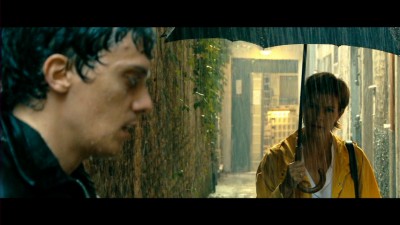
As already mentioned, it's Téchiné's neat, if deviously evasive, trick to build individual segments of the film with considerable, assured, relaxed skill that wraps you up in the moment and convinces you you're witnessing something significant, emotionally resonant, and possibly even deep play out between these characters. Téchiné, his longtime cinematographer Julien Hirsch (Notre Musique), and frequent Polanski and Alain Resnais editor Hervé de Luze know how to conceive, block, choreograph, and score (with music by Waltz with Bashir/Shutter Island composer Max Richter) a scene with subtle aplomb, engaging our attention and surprising us in visually pleasurable ways by, for example, reframing characters in too-close two-shots or pulling off a smooth, unexpectedly long tracking shot of a character in profile; it's because of the well-considered care with which the film's scenes are cinematically constructed and performed, not because of its story, that Unforgivable comes to feel like something compelling and worthy of your consideration; only when you step back and contemplate the film as a whole do you realize how its buildup of crazy happenings and reversals of feeling and fortune has accreted into something unwieldy and absurd. Everything finally sort of winds down to a stop, landing on a halfheartedly "happy" ending that has not much effect, either sincere or ironical, and this is because the kind of story Unforgivable is telling is not really made to end, ever, with any finality; it is at its core an eternal serial unveiling of secrets and amorous naked bodies, a dance in which it's the geometrical, kaleidoscopic pairings, partings, and re-pairings of characters we're fascinated by, much more than who they are, how they feel, or where they end up. It's a story for which by rights one should be tuning in tomorrow (and the next day, and the next) to find out what happens next; there's always a sexy, sensational, shocking new surprise waiting around the corner in the blatantly fictional, aggrieved and tumultuous, but always, always well-appointed lives like the one Téchiné and cowriter Mehdi Ben Attia, working from a novel by Philippe Djian, are indulging us with. That's really the best way to look at a ludicrous story, well-told as it is, like Unforgivable's -- as an indulgence. It isn't a serious movie, but through Téchiné's actually serious craftsmanship, it becomes an enjoyable simulation of something refined, like some cinematic equivalent of a gaudy, fun chunk of costume jewelry that, while it has the not-inconsiderable capacity to amuse and delight for the moment, can easily be taken out of and thrown back in the box on a whim, without too much thought being given to the matter, and without making too much of a lasting impression.
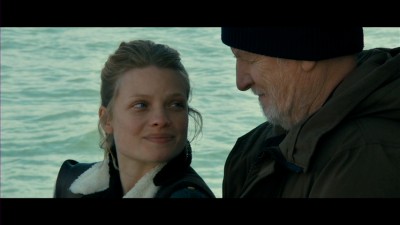
THE DVD:
The anamorphic transfer of the film, retaining its 2.35:1 widescreen theatrical aspect ratio, is middling to good: The different warm/cool color temperatures captured by cinematographer Julien Hirsch's images come through nicely, as do all colors and skin tones; a possible deficiency comes in the form of perhaps too much digital noise reduction (DNR) having been applied, leading to a flatter/slicker image than is ideal for replicating the cinematic experience at home (there is also slightly noticeable edge enhancement throughout, though never to a distracting degree). Still, some of the film's celluloid grain/texture does remain, and overall there's not too awfully much to complain about, picture quality-wise.
Sound:The film's sound is presented as a Dolby 5.1 Surround track, and it's very nicely done; it's a film with more going on sonically than one might expect, so, though all dialogue (in French and Italian with non-optional English subtitles) and ambient sounds are perfectly crystal-clear and have a great, supple aural immediacy to them, and there's no imbalance or distortion of any sound at any point, it's the actual way Max Richter's score swells up in all your speakers, a roaring boat motor, or a bass-rumbling warning-horn blast from an ocean liner (I jumped in my seat) that really strike you.
Extras:Not too much, though as usual, Strand does an unusually nice job of trying to keep it relevant: In addition to the film's theatrical trailer, they've included trailers for other French films they've released, including those for two others (The Girl on the Train and The Witnesses) also directed by Téchiné.
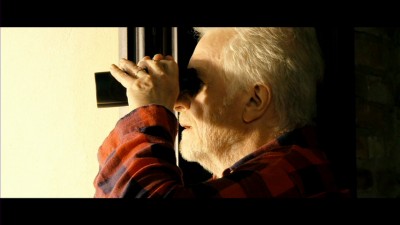
A stylish half-melodrama, half-psychological thriller that ultimately bites off quite a bit more than it can chew, André Téchiné's Unforgivable is all over the map, carrying us along with its twists and turns through the sheer propulsion of Téchiné's cinematic way with a story, no matter how unwieldy. What holds its sprawling, sensationalistic episodes together, giving them at least some semblance of connection and coherence, is Téchiné's impeccable style; he knows every visual technique of European art film by heart, and he executes them beautifully as he tells us the story of an older novelist with writer's block who marries his stunning travel agent and runs away with her to an Italian island, where he hopes to become productive again. But each half of this unlikely couple has much more than their share of history, and the film keeps spiraling out into past/current love affairs and infidelities, career ambitions, jealousies, espionage, and familial and affective relationships, at one moment going into the inevitable disappointments (and latent Freudian creepiness) in parent-child/May-December relationships, at the next veering off gratuitously into an unspeakable, shock-value episode of violence, and at still another point trying for halfhearted, truncated weepiness over the death of a noble (if alcoholic) detective played by Adriana Asti (the casting of Asti, a European screen legend now in her autumn years, is indicative of Téchiné's tendency here to explicitly wink back at past triumphs, from Bertolucci's Asti-starring Before the Revolution to Godard's Contempt -- a ploy that offers some genuine, adroitly played cinematic pleasure even as it inevitably highlights Unforgivable's comparative slightness). It's all rather overheated, and not always well-suited to Téchiné's restrained, smooth, and elegant stylistic tricks, which imply a gravity and seriousness that's often missing from what's actually going on (I, for one, would love to see what someone like Brian De Palma would do with this overstuffed, sexuality-soaked plot, derived from a French potboiler-novel by Philippe Djian). Still, the performances are quite good, the Italian coastal and Venetian settings are milked for all the decaying-glamor, coldly-modernized, poor-aristocrat, Euro-trash aura Téchiné can muster, and the film on the whole has a cool sharpness to it that can't be denied, however by-the-numbers and way-too-numerous its plot contrivances become. As well-crafted but empty exercises go, Unforgivable is worth at least one rapt (if half-guilty) look. If it's really just a bauble that's all style and virtually no substance, at least its stylishness is relaxed, seducing and insinuating itself for our savoring rather than assaulting us with slickness; it is an honestly pleasing, skillfully concocted, only half-silly diversion -- not much in the end, but also nothing viewers just looking for some relatively intelligent, visually well-honed, unchallenging escapism would consider an unforgivable waste of time. Recommended.
|
| Popular Reviews |
| Sponsored Links |
|
|
| Sponsored Links |
|
|
| Release List | Reviews | Shop | Newsletter | Forum | DVD Giveaways | Blu-Ray | Advertise |
|
Copyright 2024 DVDTalk.com All Rights Reserved. Legal Info, Privacy Policy, Terms of Use,
Manage Preferences,
Your Privacy Choices | |||||||














